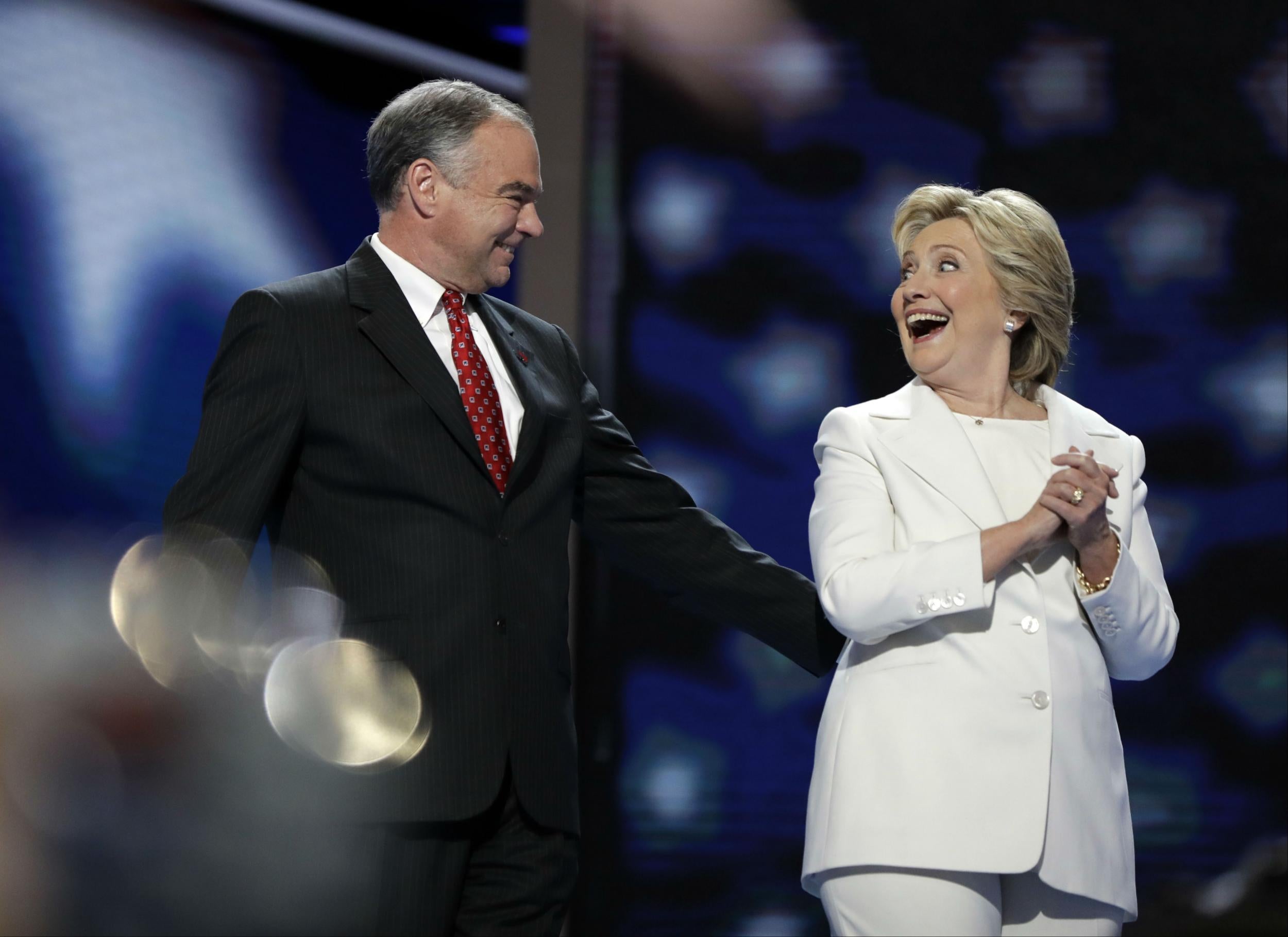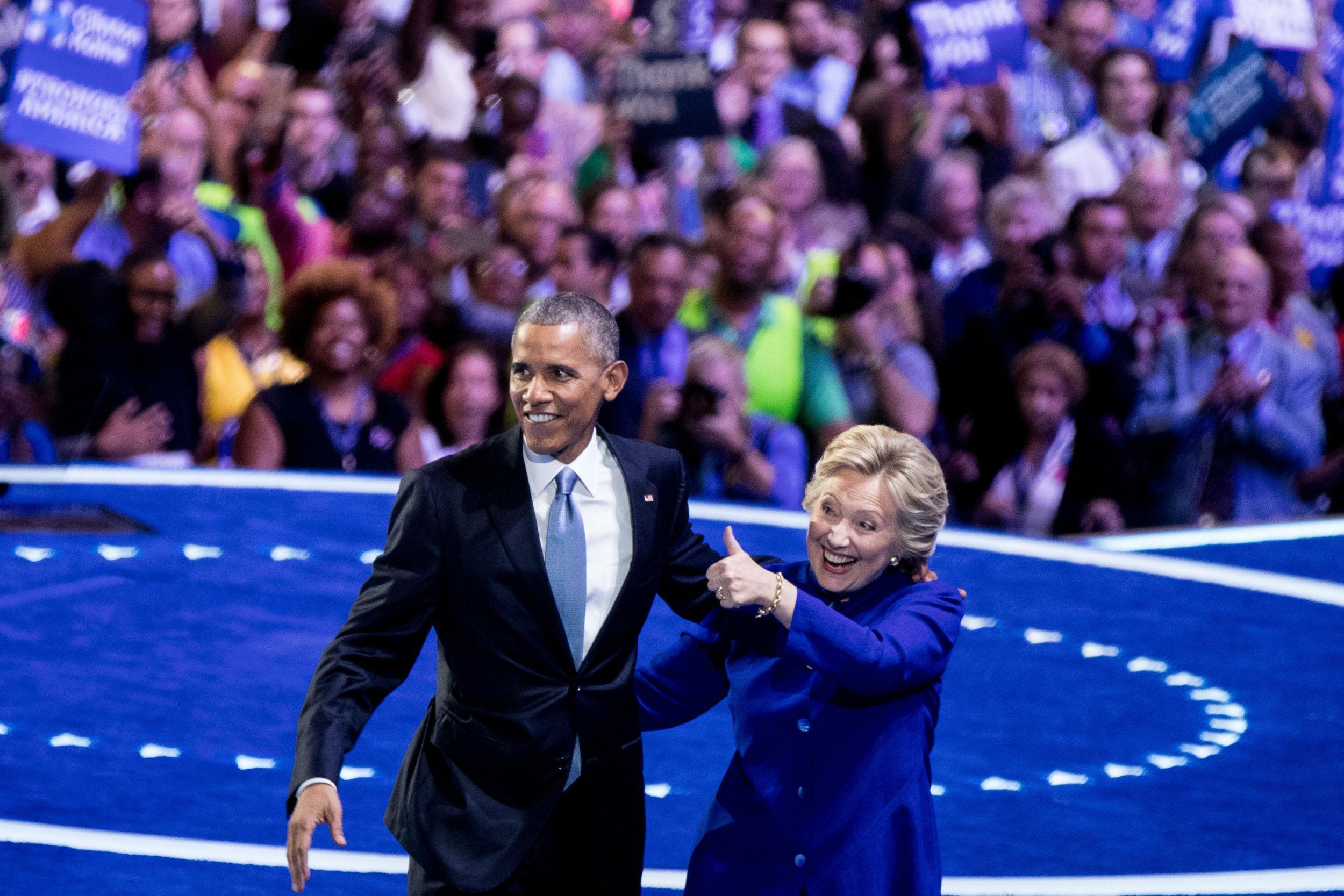DNC 2016: Hillary Clinton accepts Democratic nomination - and makes history in the process
The 69-year-old pointed out it was the first time a major US party had nominated a woman for the White House
Your support helps us to tell the story
From reproductive rights to climate change to Big Tech, The Independent is on the ground when the story is developing. Whether it's investigating the financials of Elon Musk's pro-Trump PAC or producing our latest documentary, 'The A Word', which shines a light on the American women fighting for reproductive rights, we know how important it is to parse out the facts from the messaging.
At such a critical moment in US history, we need reporters on the ground. Your donation allows us to keep sending journalists to speak to both sides of the story.
The Independent is trusted by Americans across the entire political spectrum. And unlike many other quality news outlets, we choose not to lock Americans out of our reporting and analysis with paywalls. We believe quality journalism should be available to everyone, paid for by those who can afford it.
Your support makes all the difference.“And so my friends, it with humility, determination and boundless confidence in America’s promise that I accept your nomination for President of the United States.”
Hillary Clinton was never quite going to be able to match the speech of Barack Obama.
But if Ms Clinton’s acceptance address on the final night of the Democratic National Convention fell a little short of the soaring ambition of the president’s speech the previous evening, she did nothing less than make history. And in doing so, the 69-year-old former secretary of state laid out a vision for America - inclusive, communal and progressive - that was at stark odds to that suggested by her rival Donald Trump.

And her formal acceptance of the Democratic nomination in Philadelphia, the first by a woman for a US major party, was no less significant than Mr Obama’s achievement eight years ago at the party's convention in Denver when he too broke unprecedented ground.
Over the course of 45 minutes she positioned herself as the mirror image of her rival Mr Trump, as some who would bring people together, build teams, erect bridges and not walls. She said she would work for a country “where love trumps hate”. She spoke of togetherness and hope, of working for communities, of her belief in science, and of her determination to work for minority groups and communities.
For a woman long dismissed by her opponents as a millionaire elitist, she sought to project herself as some who would stand up for the working and middle classes of America.
If oratory and language that brings out goose bumps is not necessarily her forte, then over these four days, Ms Clinton and her team, along with those who have spoken on her behalf, have sought to present her as a woman of action, achievement and humanity. The message, repeated once again on Wednesday night by Mr Obama is that there had never been a candidate more qualified to be president. In his assessment, he included both himself and her husband, former president Bill Clinton.
“America is once again at a moment of reckoning. Powerful forces are threatening to pull us apart. Bonds of trust and respect are fraying,” she said on Thursday night.
“And just as with our founders there are no guarantees. It’s truly is up to us. We have to decide whether we’re going to work together so we can all rise together.”
Ms Clinton had been introduced by her daughter, Chelsea, who described herself as a proud American, a proud Democrat, a proud mother, but mostly importantly, a proud daughter.

“My earliest memory is my mom picking me up after I fell down, giving me a little hug, and reading me ‘Goodnight Moon’,” she said.
“That feeling - being valued and loved - that’s something my mom wants for every child. It is the calling of her life.”
The four days of the convention were marked in the early stages by disagreement and dissent. Supporters of Bernie Sanders were furious about what they considered had been a rigged primary process, their anger fueled by the publication of leaked Democratic Party emails that showed officials had been plotting against Mr Sanders.
Indeed, the first day of the convention was noticeable for the number of protests from supporters of Mr Sanders, the people who said they were “Bernie or Bust”.
As it was, Ms Clinton required some of her former rivals to help win the convention hall over. On Monday night, Mr Sanders delivered a stunning, gracious and impassioned speech in which he urged his supporters to back Ms Clinton. The man who had for months railed against her for her alleged links to Wall Street and for taking money from private donors, said it was essential that the party united around her.
He said the alternative option, the election of Mr Trump, was simply not conceivable. On Thursday, Ms Clinton responded with a public thank-you, crediting him for putting issues of social justice in the spotlight.
To his supporters, she added: “I’ve heard you. Your cause is our cause.”
Yet Ms Clinton knows she has a tough fight on her hands. Just as she underestimated the potential of Mr Sanders to provide a to-the-death challenge, so many wrote off Mr Trump as little more than entertainment. That ended when he secured the Republican nomination.
“We are clear-eyed about what our country is up against. But we are not afraid. We will rise to the challenge, just as we always have,” Ms Clinton said.
“So I want to tell you tonight how we're going to empower all Americans to live better lives. My primary mission as president will be to create more opportunity and more good jobs with rising wages right here in the United States. From my first day in office to my last. Especially in places that for too long have been left out and left behind.”
She added: “From our inner cities to our small towns, Indian Country to Coal Country. From the industrial Midwest to the Mississippi Delta to the Rio Grande Valley.”
Those in the convention hall on Thursday had little doubt that the trajectory Ms Clinton was on was no less important than that taken by Mr Obama. He had been he first African American president; she could become the first woman to occupy the Oval Office.
“I’d say its 50-50 - both are important. Woman are now the majority of the country and they want to see a woman president,” said Joe Reed, a delegate from Montgomery, Alabama.
“On the other hand, there were a lot of African Americans who wanted to see a black president.”
Ms Clinton is hoping she will do better than Mr Trump in the public's mind based on her experience, especially on national security, and her ability to reach out to a more diverse part of the US population. She said, repeatedly, that she would promote a message of unity, as opposed to one of divisiveness.
She and her surrogates have also stressed the differing temperaments of the two candidates running for office.
“The choice we face is just as stark when it comes to our national security. Anyone reading the news can see the threats and turbulence we face. From Baghdad and Kabul, to Nice and Paris and Brussels, to San Bernardino and Orlando, we're dealing with determined enemies that must be defeated,” she said.
“No wonder people are anxious and looking for reassurance — looking for steady leadership.”
She added: “Every generation of Americans has come together to make our country freer, fairer, and stronger. None of us can do it alone. That’s why we are stronger together.”
By then it was the time for the fireworks to be set off and for the red, white and blue balloons to be released from the rafters. Her running mate, Tim Kaine, joined her on stage and they beamed and smiled. But as they both know, now is when the hard work begins.

Join our commenting forum
Join thought-provoking conversations, follow other Independent readers and see their replies
Comments